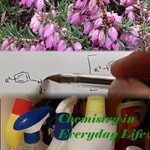Chemistry in Everyday Life – Details, episodes & analysis
Podcast details
Technical and general information from the podcast's RSS feed.

Chemistry in Everyday Life
Johannes Vogel
Frequency: 1 episode/16d. Total Eps: 41

Recent rankings
Latest chart positions across Apple Podcasts and Spotify rankings.
Apple Podcasts
🇨🇦 Canada - chemistry
01/08/2025#42🇬🇧 Great Britain - chemistry
01/08/2025#84🇺🇸 USA - chemistry
01/08/2025#33🇨🇦 Canada - chemistry
31/07/2025#42🇬🇧 Great Britain - chemistry
31/07/2025#84🇺🇸 USA - chemistry
31/07/2025#33🇨🇦 Canada - chemistry
30/07/2025#43🇬🇧 Great Britain - chemistry
30/07/2025#84🇺🇸 USA - chemistry
30/07/2025#32🇨🇦 Canada - chemistry
29/07/2025#42
Spotify
No recent rankings available
Shared links between episodes and podcasts
Links found in episode descriptions and other podcasts that share them.
See allRSS feed quality and score
Technical evaluation of the podcast's RSS feed quality and structure.
See allScore global : 58%
Publication history
Monthly episode publishing history over the past years.
Asphalt - Chemie im Straßenbau
Season 3 · Episode 1
mercredi 5 janvier 2022 • Duration 24:52
Roads are one of the defining features of modern civilizations, believe it or not. To me and I think most others, the state of the roads in a country gives an idea of the level of development. It does not surprise then that chemistry features quite heavily in how we make roads.
A request from a listener, I explore in this episode the chemistry of bitumen and the physical properties needed for a good road.
This podcast is still not reactivated, but if you have a topic that you are interested in and do not mind an extended waiting time until I get round to it, drop me a mail under chem.podcast@gmail.com .
SourcesBackground Information
Polymer Chemistry, An Introduction Malcolm P. Stevens, 3rd Ed. Oxford University Press, 1999; ISBN 978-0-19-512444-6 pp. 70ff & 87ff
https://en.wikipedia.org/wiki/Asphalt
https://de.wikipedia.org/wiki/Asphalt_(Geologie)
https://en.wikipedia.org/wiki/Asphalt_concrete
https://de.wikipedia.org/wiki/Asphalt
Polymer-modified Bitumen
http://oxidizedbitumen.org/primer-bitumen/asphalt-polymer
https://www.corrosionpedia.com/definition/3215/polymer-modified-bitumen-pmb
https://globecore.com/bitumen-modification-polymers/
https://www.sciencedirect.com/science/article/pii/B9780857090485500018
https://bitumen.globecore.com/use-polymer-bitumen-binders-road-construction
Glass Transition Temperature
https://en.wikipedia.org/wiki/Glass_transition
https://de.wikipedia.org/wiki/Glas%C3%BCbergangstemperatur
Grundlagenvideo Asphalt-Straßenbau
https://www.youtube.com/watch?v=PeMeZy9ayV8
Intro Video to Bitumen
https://www.youtube.com/watch?v=Q39vKdNuJKQ
How much bitumen per kilometer of road
https://saharabizz.com/how-much-bitumen-used-in-road-construction-per-kilometre/
Styrene-Butadiene-Styrene Polymer in Asphalt
https://www.sciencedirect.com/topics/engineering/styrene-butadiene-styrene
Video: Bier während der Arbeit? Welche Klischees über Straßenbauarbeiter stimmen? | Galileo | ProSieben
2:59 „Alle 15 Jahre muss ein Straßenbelag erneuert werden…“
Last episode of Chemistry in Everyday Life: Cyanide Poisoning
mardi 28 septembre 2021 • Duration 10:27
It takes a little bit more than 100mg of cyanide to kill a 75 kg human being. A little more than 100mg and the unfortunate victim will show the telltale signs of “bluish tones of oxygen deprivation mottle the skin.“
Cyanide Poisoning is as old as the usage of chemical compounds containing cyanide and this episode looks at the chemistry that happens in the body during a poisoning.
“This will be the last episode of Chemistry in Everyday Life for now. It was a huge amount of fun, but for the usual reasons, I have to suspend this beloved hobby project for an indefinite period of time. I would like to thank you all for listening. I enjoyed this experience immensely and I am proud of what I achieved. Take care everyone 😊”
The Podcast will remain online for the time being, but I will not add any new content.
Sources
Historical Background
· The Poisoner’s Handbook: Murder and the Birth of Forensic Medicine in Jazz Age New York, Chapter 3, 2010, D. Blum ISBN: 978-1594202438
Cyanide Poisoning and Cyanide Chemistry
· https://en.wikipedia.org/wiki/Cyanide_poisoning
· https://www.thoughtco.com/overview-of-cyanide-poison-609287
· https://en.wikipedia.org/wiki/Cyanide
· https://en.wikipedia.org/wiki/Histotoxic_hypoxia
Oxidative Phosphorylation and Cytochrome C Oxidase
· https://en.wikipedia.org/wiki/Cytochrome_c_oxidase#Inhibition
· https://en.wikipedia.org/wiki/Oxidative_phosphorylation
· https://en.wikipedia.org/wiki/Electron_transport_chain
Mitochondria
· https://en.wikipedia.org/wiki/Mitochondrion
· https://www.thoughtco.com/mitochondria-defined-373367
Medical Treatment for Cyanide Poisoning
Life-saving explosions - Airbags
Season 1 · Episode 31
dimanche 23 mai 2021 • Duration 21:38
In this episode I confront the horrible memory of my one and only bad car crash. I only remember fragments, but the airbag was a big part of the memory. If you want to know how explosions save lives everyday on the road, then tune in.
If you would like to share feedback or have a suggestion for a topic, I can now be reached on twitter under @ChemistryinEve1or you can leave a comment on my website https://chemistryineverydaylife574446112.wordpress.com/. Alternatively, you can send an email to chem.podcast@gmail.com.
Sources
Airbag Technology
· https://en.wikipedia.org/wiki/Airbag
· https://de.wikipedia.org/wiki/Airbag
· https://en.wikipedia.org/wiki/Electric_match
· https://en.wikipedia.org/wiki/Gas_generator
Chemicals used in Airbags
· https://en.wikipedia.org/wiki/Sodium_azide
· https://en.wikipedia.org/wiki/Nitroguanidine
· https://de.wikipedia.org/wiki/Nitroguanidin
· https://en.wikipedia.org/wiki/Guanidine_nitrate
· https://de.wikipedia.org/wiki/Guanidiniumnitrat
Density, Avogadro’s constant and the Mole
· https://en.wikipedia.org/wiki/Density
· https://de.wikipedia.org/wiki/Dichte
· https://en.wikipedia.org/wiki/Avogadro_constant
· https://de.wikipedia.org/wiki/Avogadro-Konstante
· https://en.wikipedia.org/wiki/Mole_(unit)
· https://de.wikipedia.org/wiki/Mol
Further Reading on Airbags
· https://www.explainthatstuff.com/airbags.html
· http://www.chemistry.wustl.edu/~edudev/LabTutorials/CourseTutorials/bb/Airbags/151_T5_07_airbags.pdf
· https://www.chemie-azubi.de/detailansicht/news/klugscheisser-wissen-wie-funktioniert-ein-airbag/
Fun video on Airbag demonstration
· https://www.youtube.com/watch?v=vc4I4hvy_hM
· General Chemistry Ebbing p. 27ff, 190-197
Side Note: Seemingly a connection to rocket fuel
Breathe in, Breathe Out - Oxygen Transfer in the Blood
Season 1 · Episode 30
dimanche 9 mai 2021 • Duration 19:44
Oxygen in, Carbon Dioxide out. We learn this basic paradigm about breathing from a very early age on. But how does it work? From a chemical viewpoint this is a lot of fun! So let’s look into it 😊
If you would like to share feedback or have a suggestion for a topic, I can now be reached on twitter under @ChemistryinEve1or you can leave a comment on my website https://chemistryineverydaylife574446112.wordpress.com/. Alternatively, you can send an email to chem.podcast@gmail.com.
Sources
Blood, Red Blood Cells and Haemoglobin
· https://en.wikipedia.org/wiki/Blood
· https://en.wikipedia.org/wiki/Red_blood_cell
· https://de.wikipedia.org/wiki/Erythrozyt
· https://en.wikipedia.org/wiki/Hemoglobin
· https://en.wikipedia.org/wiki/Heme
· https://de.wikipedia.org/wiki/H%C3%A4moglobin
· https://de.wikipedia.org/wiki/H%C3%A4me_(Stoffgruppe)
· https://en.wikipedia.org/wiki/Porphyrin
The Human Respiratory System
· https://en.wikipedia.org/wiki/Respiratory_system
The Bohr Effect and Haldane Effect
· https://en.wikipedia.org/wiki/Haldane_effect
· https://en.wikipedia.org/wiki/Bohr_effect
· https://en.wikipedia.org/wiki/Carbaminohemoglobin
Khan’s academy explaining Bohr effect and Haldane’s effect
· https://www.youtube.com/watch?v=dHi9ctwDUnc
Coordination Chemistry
· https://en.wikipedia.org/wiki/Coordination_complex
· https://de.wikipedia.org/wiki/Komplexchemie
· https://en.wikipedia.org/wiki/Coordinate_covalent_bond
· https://pediaa.com/difference-between-covalent-and-coordinate-bond/
· Inorganic Chemistry by C. E. Housecroft and A. G. Sharpe 1st Edition 2001 ISBN 0582-31080-6
Smokers and Carbon Monoxide
· https://en.wikipedia.org/wiki/Carbon_monoxide
· https://en.wikipedia.org/wiki/Carbon_monoxide_poisoning
· https://en.wikipedia.org/wiki/Carboxyhemoglobin
· https://de.wikipedia.org/wiki/Ligand
· https://en.wikipedia.org/wiki/Denticity
Sickle Cell Disease
Sing this corrosion to me
Season 1 · Episode 29
dimanche 25 avril 2021 • Duration 14:40
Why does iron rust? Why does this not happen for stainless steel? How else can we protect materials from corrosion? If you want to know, listen to this episode 😉
If you would like to share feedback or have a suggestion for a topic, I can now be reached on twitter under @ChemistryinEve1or you can leave a comment on my website https://chemistryineverydaylife574446112.wordpress.com/. Alternatively, you can send an email to chem.podcast@gmail.com.
Sources
Rust – Wikipedia entry
· https://en.wikipedia.org/wiki/Rust
Corrsion – Wikipedia entry
· https://en.wikipedia.org/wiki/Corrosion
Aqua regia – Wikipedia entry
· https://en.wikipedia.org/wiki/Aqua_regia
Stainless Steel - Wikipedia entry
· https://en.wikipedia.org/wiki/Stainless_steel
Protection from Corrosion - Wikipedia entry
· https://en.wikipedia.org/wiki/Corrosion_inhibitor
· https://en.wikipedia.org/wiki/Passivation_(chemistry)
Galvanization - Wikipediaeintrag
· https://en.wikipedia.org/wiki/Galvanization
Galvanic Series
· https://en.wikipedia.org/wiki/Galvanic_series
Aluminium vs. Aluminum
· https://www.thoughtco.com/aluminum-or-aluminium-3980635
Video: FuseSchool – Chemistry: Corrosion
· https://www.youtube.com/watch?v=TKMgUCq3npg&t=29s
Valmont Galvanization Advertisement Video: What is Galvanizing
· https://www.youtube.com/watch?v=f6WYxkhum-s
Video: The chemistry of Galvanized Iron: Lessons in Chemistry
· https://www.youtube.com/watch?v=c5DhBPr-TKw
Other Sources
· https://www.thenakedscientists.com/articles/questions/why-do-some-metals-rust-faster-others
· https://www.patriotfoundry.com/news/metal-corrosion-properties-explained/
· https://www.thoughtco.com/oxidation-reduction-reactions-604037
· https://sciencing.com/effects-oxidation-copper-8613905.html
The concept of energy in the human body
Season 1 · Episode 28
dimanche 11 avril 2021 • Duration 19:20
I always found the concept of energy in the human body very intriguing… or in any organism for that matter. The term energy is very abstract to me. For example, there is a difference to “having the energy to go for a walk” or “the energy to power the oven”. One phrase clearly describes energy as electricity and the other is the energy needed for an activity that we humans undertake. So what is energy in a human being or an animal?
If you would like to share feedback or have a suggestion for a topic, I can now be reached on twitter under @ChemistryinEve1 or you can leave a comment on my website. Alternatively, you can send an email to chem.podcast@gmail.com.
Sources
How is energy produced
· https://www.metabolics.com/blog/how-does-the-body-produce-energy
Adenosine triphosphate – the body’s Mars Bar
· https://en.wikipedia.org/wiki/Adenosine_triphosphate
ATP production under aerobic conditions
· https://www.ncbi.nlm.nih.gov/books/NBK553175/
· https://en.wikipedia.org/wiki/Glycolysis
· https://en.wikipedia.org/wiki/Citric_acid_cycle
· https://en.wikipedia.org/wiki/Oxidative_phosphorylation
· https://en.wikipedia.org/wiki/Beta_oxidation
· https://en.wikipedia.org/wiki/Ketone_bodies
ATP production under anaerobic conditions
· https://en.wikipedia.org/wiki/Fermentation
· https://en.wikipedia.org/wiki/Anaerobic_respiration
· https://en.wikipedia.org/wiki/Adenosine_triphosphate#ATP_recycling
What does it feel like to run low on ATP?
· https://www.verywellhealth.com/low-energy-and-atp-in-fibromyalgia-and-me-cfs-4125121
The biochemistry of muscle fatigue
· https://pubmed.ncbi.nlm.nih.gov/3964254/
Why ATP and not GTP, TTP or CTP?
· https://www.researchgate.net/post/Why_did_evolution_favor_ATP_and_not_GTP_TTP_or_CTP
Space. The Final Frontier...
Season 1 · Episode 27
dimanche 28 mars 2021 • Duration 18:28
Space. The Final frontier… a friend of mine asked me if there is chemistry in space and how it is different from the chemistry, we observe here on Earth. This is an exciting topic. So exciting that I had to make a podcast episode about it.
If you would like to share feedback or have a suggestion for a topic, I can now be reached on twitter under @ChemistryinEve1. Alternatively, you can send an email to chem.podcast@gmail.com.
Please note: I made a mistake in this episode. I called the analytical method “nucleor magnetic resonance spectroscopy” accidentally “nuclear magnetic resonance spectrometry”. I apologise for this error.
Sources
My usual Wikipedia starting point
· https://en.wikipedia.org/wiki/Astrochemistry
· https://de.wikipedia.org/wiki/Astrochemie
· https://en.wikipedia.org/wiki/Cosmochemistry
· https://de.wikipedia.org/wiki/Kosmochemie
Relevant Physical phenomena and measurements
· https://en.wikipedia.org/wiki/Speed_of_light
· https://en.wikipedia.org/wiki/Earth%27s_circumference
· https://en.wikipedia.org/wiki/Absolute_zero
· https://de.wikipedia.org/wiki/Absoluter_Nullpunkt
Analytical Techniques in Astrochemistry
· https://en.wikipedia.org/wiki/Astronomical_spectroscopy
· https://en.wikipedia.org/wiki/Spectroscopy
· https://en.wikipedia.org/wiki/Radio_astronomy
Incredible YouTube teaching video by The National Radio Astronomy Observatory NRAO
· https://www.youtube.com/watch?v=dU11DO08H5k&t=215s
The Miller-Urey Experiment
· https://en.wikipedia.org/wiki/Miller%E2%80%93Urey_experiment
WILD-2 comet contains basic amino acid
· https://stardust.jpl.nasa.gov/news/news115.html
Panspermia Hypothesis
· https://en.wikipedia.org/wiki/Panspermia
Princeton introductory lecture notes on Astrochemistry
· https://www.astro.princeton.edu/events/spitzer_lecture_series/Lecture1.pdf
“How Stuff Works!” YouTube Video on Astrochemistry
· https://www.youtube.com/watch?v=ayFzljd1l0Q
Rencontres du Vietnam: “Search for Life: From early Earth to Exoplanets” by Masatoshi Ohishi
· https://www.youtube.com/watch?v=Q84Ow3ZkODo
Harvard Lecture: Astrochemistry at the Dawn of Star and Planet Formation by Paola Caselli (YouTube)
Distilling the essence - Talking about Distillation
Season 1 · Episode 26
dimanche 14 mars 2021 • Duration 19:49
I always tried to avoid making an episode about making alcoholic beverages, because there is already so much great content about it and I did not see the extra value in talking about it. For this episode, I shall break this taboo, by talking about distillation. A technique that is used for making spirits, but also for so much more, which is why I only mention spirits at the end as a side note. I hope you enjoy listening to it.
If you would like to share feedback or have a suggestion for a topic, I can now be reached on twitter under @ChemistryinEve1. Alternatively, you can send an email to chem.podcast@gmail.com.
Sources
About distillation
· https://en.wikipedia.org/wiki/Distillation
· https://de.wikipedia.org/wiki/Destillation
About specific pieces of the distillation kit
· https://en.wikipedia.org/wiki/Fractional_distillation
· https://en.wikipedia.org/wiki/Fractionating_column
· https://en.wikipedia.org/wiki/Condenser_(laboratory)#Vigreux
· https://en.wikipedia.org/wiki/Raschig_ring
About different theoretical topics concerning distillation
· https://en.wikipedia.org/wiki/Boiling_point
· https://en.wikipedia.org/wiki/Vapor_pressure
· https://en.wikipedia.org/wiki/Raoult%27s_law
· https://en.wikipedia.org/wiki/Dalton%27s_law
· https://en.wikipedia.org/wiki/Vapor%E2%80%93liquid_equilibrium
About petroleum distillation
· https://en.wikipedia.org/wiki/Petroleum#Formation
Youtube Videos on Whiskey Making
· https://www.youtube.com/watch?v=kNW2TJAQrCE
· https://www.youtube.com/watch?v=cR7Bt9Ei_zI
Youtube Video on Tequila Making
· https://www.youtube.com/watch?v=dmAZ0aH0P9o
Youtube Video on Rum Making
· https://www.youtube.com/watch?v=4i4_bouIZqw
You Tube Video on Bourbon
Portable Power - Batteries and their Chemistry
Season 1 · Episode 25
dimanche 28 février 2021 • Duration 17:11
Batteries are ubiquitous in daily life and I took them for granted for such a long time that I felt obliged to write an episode about them. Especially since they work thanks to a very basic concept called Redox Reactions.
If you would like to share feedback or have a suggestion for a topic, I can now be reached on twitter under @ChemistryinEve1. Alternatively, you can send an email to chem.podcast@gmail.com.
Sources
Redox Chemistry and electrochemistry
· https://en.wikipedia.org/wiki/Redox
· https://en.wikipedia.org/wiki/Electrochemistry
Batteries and their construction
· https://en.wikipedia.org/wiki/Electric_battery
· https://en.wikipedia.org/wiki/Electrochemical_cell
· https://en.wikipedia.org/wiki/Galvanic_cell
· https://en.wikipedia.org/wiki/Half-cell
· https://en.wikipedia.org/wiki/Electrolyte#Electrochemistry
· https://en.wikipedia.org/wiki/Primary_cell
List of battery types, rechargeable and non-rechargeable batteries
· https://en.wikipedia.org/wiki/List_of_battery_types
· https://en.wikipedia.org/wiki/Rechargeable_battery
· https://en.wikipedia.org/wiki/Alkaline_battery
Samsung’s Battery Issue
· https://en.wikipedia.org/wiki/Samsung_Galaxy_Note_7#Battery_faults
Excellent explanatory Videos
· https://www.youtube.com/watch?v=IV4IUsholjg
· https://www.youtube.com/watch?v=9OVtk6G2TnQ
· https://www.youtube.com/watch?v=G5McJw4KkG8
Video of a galvanic cell
A World of Mirror Images
Season 1 · Episode 24
dimanche 14 février 2021 • Duration 15:31
From winter gloves and people with inverted organs to the effects of molecular mirror images. Chirality can be found everywhere, so it is high time to talk about it.
If you would like to share feedback or have a suggestion for a topic, I can now be reached on twitter under @ChemistryinEve1. Alternatively, you can send an email to chem.podcast@gmail.com.
Sources
Wikipedia entries on Chirality and Enantiomers
· https://en.wikipedia.org/wiki/Chirality
· https://en.wikipedia.org/wiki/Chirality_%28chemistry%29
· https://en.wiktionary.org/wiki/chirality
· https://en.wikipedia.org/wiki/Enantiomer
· https://de.wikipedia.org/wiki/Enantiomer
· https://de.wikipedia.org/wiki/Chiralit%C3%A4t_(Chemie)
Textbook Entries on Chirality
· General Chemistry by D. D. Ebbing 5th Ed. 1996 ISBN 0-395-74415-6; p. 1002ff
· Organic Chemistry by Clayden, Warren & Wothers; p. 382ff
Thalidomide and its effect on pregnant women
· https://de.wikipedia.org/wiki/Thalidomid
· https://en.wikipedia.org/wiki/Thalidomide
About the people with inversed organs
· https://en.wikipedia.org/wiki/Situs_inversus
· https://de.wikipedia.org/wiki/Situs_inversus
Origins of L-amino acids
Meteorite Theory (extraterrestrial influence)
· https://www.ncbi.nlm.nih.gov/pmc/articles/PMC2667035/
· https://en.wikipedia.org/wiki/Murchison_meteorite
Asymmetric Synthesis of Chirality
· https://pubmed.ncbi.nlm.nih.gov/11848967/
· https://www.sciencedirect.com/science/article/abs/pii/S0959943603704878?via%3Dihub
· https://www.onlinelibrary.wiley.com/doi/10.1002/anie.200290005









